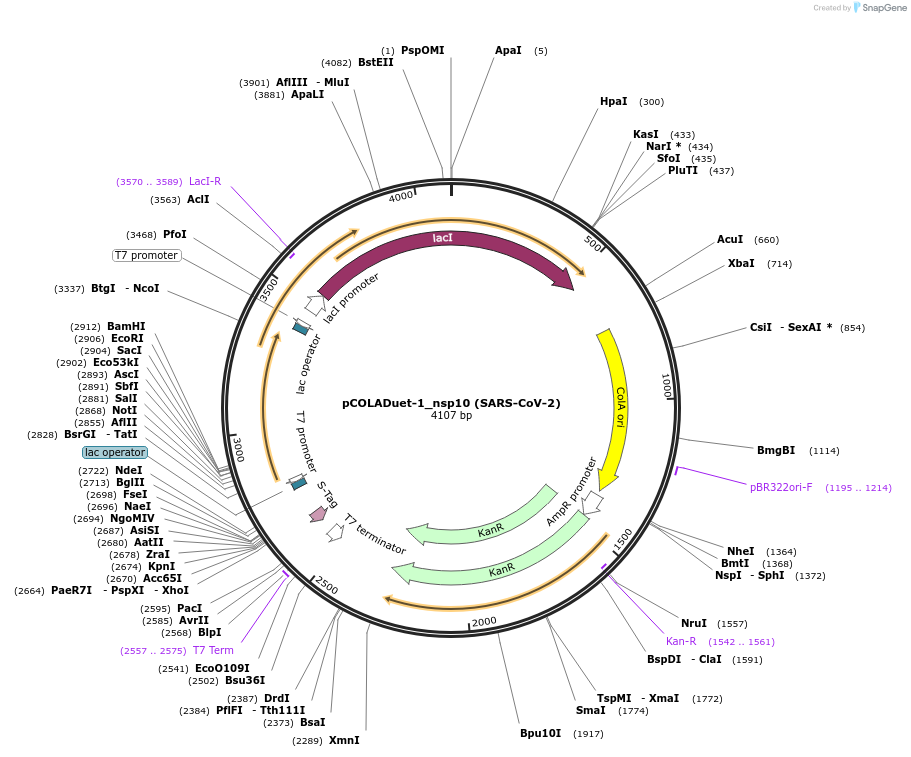pCOLADuet-1_nsp10 (SARS-CoV-2)
(Plasmid
#169158)
-
PurposeTo express SARS-CoV-2 nsp10 in E. coli
-
Depositing Lab
-
Sequence Information
Ordering
| Item | Catalog # | Description | Quantity | Price (USD) | |
|---|---|---|---|---|---|
| Plasmid | 169158 | Standard format: Plasmid sent in bacteria as agar stab | 1 | $89 | |
Backbone
-
Vector backbonepCOLADuet-1
- Total vector size (bp) 4107
-
Vector typeBacterial Expression
Growth in Bacteria
-
Bacterial Resistance(s)Kanamycin, 50 μg/mL
-
Growth Temperature37°C
-
Growth Strain(s)DH5alpha
-
Copy numberUnknown
Gene/Insert
-
Gene/Insert namensp10
-
Alt nameuntagged nsp10
-
Alt nameSARS-CoV-2 nsp10 cofactor
-
SpeciesSARS-CoV-2
-
MutationCodon optimised for E. coli
-
GenBank ID
-
Entrez GeneORF1ab (a.k.a. GU280_gp01)
- Promoter T7
-
Tag
/ Fusion Protein
- Methionine (N terminal on insert)
Cloning Information
- Cloning method Gibson Cloning
- 5′ sequencing primer ATGCGACTCCTGCATTAG
- 3′ sequencing primer ATGCGGCCGTGTACAATAC
- (Common Sequencing Primers)
Resource Information
-
Supplemental Documents
Terms and Licenses
-
Academic/Nonprofit Terms
-
Industry Terms
- Not Available to Industry
Trademarks:
- Zeocin® is an InvivoGen trademark.
Depositor Comments
Unlike SARS-CoV-2 nsp10 that gets expressed in the context of a larger polypeptide, this SARS-CoV-2 nsp10 gets expressed from a 5' ATG, and thus might contain a methionine at the N-terminus that is not present in the nsp5-cleaved nsp10 in cells.
These plasmids were created by your colleagues. Please acknowledge the Principal Investigator, cite the article in which the plasmids were described, and include Addgene in the Materials and Methods of your future publications.
-
For your Materials & Methods section:
pCOLADuet-1_nsp10 (SARS-CoV-2) was a gift from John Diffley (Addgene plasmid # 169158 ; http://n2t.net/addgene:169158 ; RRID:Addgene_169158) -
For your References section:
Identifying SARS-CoV-2 antiviral compounds by screening for small molecule inhibitors of nsp14/nsp10 exoribonuclease. Canal B, McClure AW, Curran JF, Wu M, Ulferts R, Weissmann F, Zeng J, Bertolin AP, Milligan JC, Basu S, Drury LS, Deegan TD, Fujisawa R, Roberts EL, Basier C, Labib K, Beale R, Howell M, Diffley JFX. Biochem J. 2021 Jul 16;478(13):2445-2464. doi: 10.1042/BCJ20210198. 10.1042/BCJ20210198 PubMed 34198326







